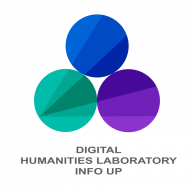Skip to content
ARTYKUŁY NAUKOWE Z ZAKRESU HUMANISTYKI CYFROWEJ – wybór z lat 2012–2016
- Bakkalbasi Nisa, Jaggars Damon, Rockenbach Barbara, Re– skilling for the digital humanities: measuring skills, engagement, and learning, „Library Management” 2015, nr 3, s. 208–214
- Black Michael L., The World Wide Web as Complex Data Set: Expanding the Digital Humanities into the Twentieth Century and Beyond through Internet Research, „Journal of Humanities & Arts Computing: A Journal of Digital Humanities” 2016, nr 1, s. 95–109
- Brügger Niels, Finnemann Niels Ole, The Web and Digital Humanities: Theoretical and Methodological Concerns, „Journal of Broadcasting & Electronic Media” 2013, nr 1, s. 66–80
- Burns Jane A., Role of the Information Professional in the Development and Promotion of Digital Humanities Content for Research, Teaching, and Learning in the Modern Academic Library: An Irish Case Study, „New Review of Academic Librarianship” 2016, nr 2/3, s. 238–248
- Caton Paul, On the term ‘text’ in digital humanities, „Literary & Linguistic Computing” 2013, nr 2, s. 209–220
- Clarke Robert Garth Hipkins, Thomas Sharon, Digital Narrative and the Humanities: An Evaluation of the Use of Digital Storytelling in an Australian Undergraduate Literary Studies Program, „Higher Education Studies” 2012, nr 3, s. 30–43
- Deegan Marilyn, „This Ever More Amorphous Thing called Digital Humanities„: Whither the Humanities Project?, „Arts and Humanities in Higher Education: An International Journal of Theory, Research and Practice” 2014, nr 1/2, s. 24–41
- Draxler Bridget; Hsieh Haowei, Dudley Nicole; Winet Jon, Undergraduate Peer Learning and public Digital Humanities Research, „E– Learning and Digital Media”, 2012, nr 3, p. 284–297
- Enoch Jessica, Bessette Jean, Meaningful Engagements: Feminist Historiography and the Digital Humanities, „College Composition and Communication” 2013, nr 4, s. 634–660
- Earhart Amy E., The Digital Edition and the Digital Humanities, „Textual Cultures: Text, Contexts, Interpretation” 2012, nr 1, s. 18–28
- Gould Amanda Starling, Doing Humanities Scholarship Online: A Case Study for the Literary Digital Humanities Writing Course, „Interdisciplinary Humanities” 2014, nr 1, s. 23–41
- Green Harriett E., Facilitating Communities of Practice in Digital Humanities: Librarian Collaborations for Research and Training in Text Encoding, „Library Quarterly” 2014, nr 2, s. 219–234
- Hadi Widad El, Digital Libraries and Digital Humanities: Some Reflections on their Synergy, „Pakistan Journal of Information Management & Libraries” T. 17 (2016), numer specjalny, s. 13–28
- Hergenrader Trent, The place of videogames in the digital humanities, „On the Horizon” 2016, nr 1, s. 29–33
- Horowitz Ellie, Artifacts of the Encounter and the Digital Humanities, „Serials Librarian”, nr 2, s. 143–150
- Hunter Andrea, The Digital Humanities and Democracy, „Canadian Journal of Communication” 2015, nr 3, s. 407–423
- Kirschenbaum Matthew, What Is „Digital Humanities,” and Why Are They Saying Such Terrible Things about It? „Differences: A Journal of Feminist Cultural Studies” 2014, nr 1, s. 46–63
- Kopec Andrew, The Digital Humanities, Inc.: Literary Criticism and the Fate of a Profession, „PMLA: Publications of the Modern Language Association of America” 2016, nr 2, s. 324–339
- Kulawik Bernd, Why and how to avoid complex non– free software in Digital Humanities projects, „Information Services & Use” 2016, nr 3/4, s. 203– 210
- London Jennifer A., Re– imagining the Cambridge School in the Age of Digital Humanities, „Annual Review of Political Science” T. 19 (2016), s. 351–373
- Mandell Laura, Grumbach Elizabeth, The Business of Digital Humanities: Capitalism and Enlightenment, „Scholarly & Research Communication” 2015, nr 4, s. 1– 9
- Moazeni Sarah Leila, Integrating Digital Humanities into the Library and Information Science Curriculum, „Public Services Quarterly” 2015, nr 3, s. 225–231
- Phillips Murray G., Osmond Gary, Australia’s Women Surfers: History, Methodology and the Digital Humanities, „Australian Historical Studies” 2015, nr 2, s. 285–303
- Potter Claire Bond, Hacker in Every History Department: An Intelligent Radical’s Guide to the Digital Humanities, „Radical Teacher” T. 99 (2014),43–53
- Rice Jeff, Occupying the Digital Humanities, „College English” 2013, nr 4, s. 360–378
- Royles Dan, Teaching Digital Humanities with Oral History: The Staring Out to Sea Oral History Project and OHMS in the DH Classroom, „Oral History Review” 2016, nr 2, s. 408–420
- Saklofske Jon, Digital Theoria, Poiesis, and Praxis: Activating Humanities Research and Communication Through Open Social Scholarship Platform Design, „Scholarly & Research Communication” 2016, nr 2, s. 1–15
- Starosielski Nicole, Resource Operations of the Ecological Digital Humanities, „PMLA: Publications of the Modern Language Association of America” 2016, nr 2, s. 401–409
- Sula Chris Alen, Digital Humanities and Libraries: A Conceptual Model, „Journal of Library Administration” 2013, nr 1, s. 10–26
- Svensson Patrik, The Digital Humanities as a Humanities Project, „Arts and Humanities in Higher Education: An International Journal of Theory, Research and Practice” 2012, nr 1/2, s. 42–60
- Thomas Leah, Cartographic and Literary Intersections: Digital Literary Cartographies, Digital Humanities, and Libraries and Archives, „Journal of Map & Geography Libraries” 2013, nr 3, s. 335–349
- Tracy Daniel G., Assessing Digital Humanities Tools: Use of Scalar at a Research University, „Libraries and the Academy” 2016, nr 1, s. 163–189
- Van Ruyskensvelde Sarah, Towards a History of e–Ducation? Exploring the Possibilities of Digital Humanities for the History of Education, „Paedagogica Historica: International Journal of the History of Education” 2014, nr 6, s. 861–870
- Vandegrift Micah, Varner Stewart, Evolving in Common: Creating Mutually Supportive Relationships Between Libraries and the Digital Humanities, „Journal of Library Administration” 2013, nr 1, s. 67–78
- Warren Meredith J.C., Teaching with Technology: Using Digital Humanities to Engage Student Learning, „Teaching Theology & Religion” 2016, nr 3, s. 309–319
- Wilkens Matthew, Digital Humanities and Its Application in the Study of Literature and Culture, „Comparative Literature” 2015, nr 1, s. 12–20
- Yamamoto Junko, Ananou Simeon, Humanity in the Digital Age: Cognitive, Social, Emotional, and Ethical Implications, „Contemporary Educational Technology” 2015, nr 1, s. 1–18


